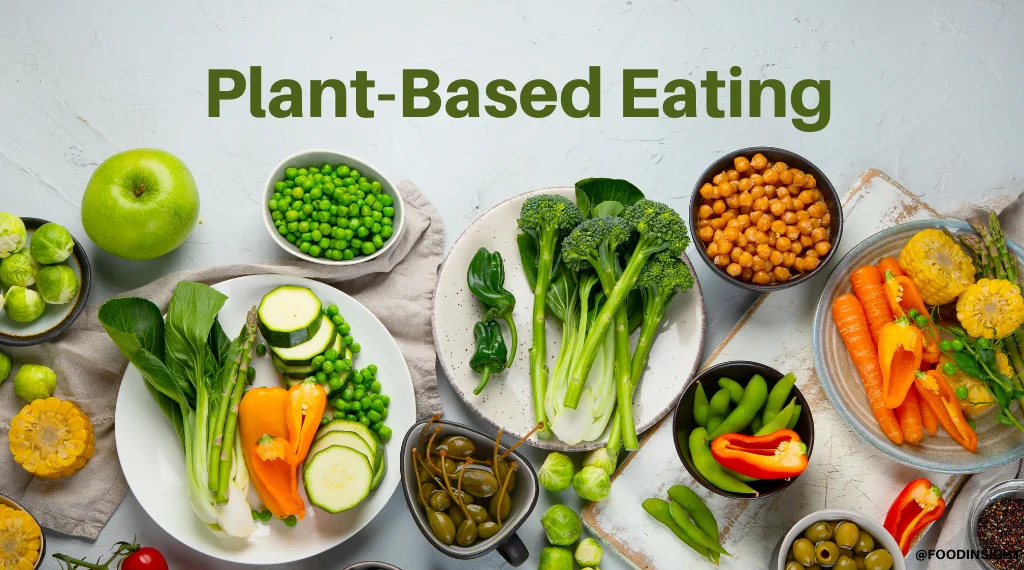Everything About Healthy And Balanced Food: Advantages of Taking On Plant Based Choices
The discussion bordering plant-based diet plans has acquired substantial interest in the last few years. Several people are exploring the prospective wellness advantages, dietary benefits, and ecological influences connected with these nutritional choices. As people become extra knowledgeable about their food's impact on wellness and sustainability, inquiries emerge concerning the usefulness of adopting such a way of living. What details changes can one expect, and how might these choices reshape not just individual health and wellness however likewise the planet's future?
Comprehending Plant-Based Diet Regimens
Numerous people associate plant-based diet plans generally with vegetarianism or veganism, these diets can encompass a large array of consuming patterns that focus on whole, minimally refined plant foods. Such diet plans frequently include fruits, veggies, entire grains, nuts, legumes, and seeds, while limiting or removing animal products. This adaptability permits individuals to customize their nutritional options according to personal preferences and dietary needs. Some may take on a mostly plant-based diet plan while still occasionally consuming meat or dairy, commonly referred to as a flexitarian technique. The emphasis remains on integrating even more plant foods, which can bring about a diverse range of dishes and tastes. Comprehending these various interpretations of plant-based consuming is essential for valuing its ease of access and charm in contemporary food culture.
Health And Wellness Benefits of Plant-Based Foods
The health benefits of plant-based foods are significant, offering a nutrient density benefit that sustains total health. Study indicates that these foods can enhance heart health and wellness and play a necessary role in efficient weight administration. By integrating a lot more plant-based choices, people might improve their dietary choices and advertise long-term wellness.
Nutrient Density Benefit
Nutrient thickness plays an important duty in the health advantages of plant-based foods, making them a compelling selection for those seeking a balanced diet regimen. Plant-based foods, such as fruits, veggies, vegetables, nuts, and whole grains, are commonly rich in essential vitamins, minerals, and antioxidants while being reduced in calories. This high nutrient thickness permits people to take in less calories while still fulfilling their dietary demands. Additionally, these foods are loaded with nutritional fiber, promoting digestive wellness and assisting in weight administration. By including nutrient-dense plant-based options, consumers can boost their overall health and wellness, support their immune systems, and lower the danger of persistent illness. Inevitably, the nutrient density of plant-based foods highlights their relevance in a health-conscious way of life.
Heart Health Improvement

Weight Administration Support
Along with promoting heart wellness, a plant-based diet can substantially aid in weight administration. This dietary technique highlights entire foods such as fruits, veggies, legumes, nuts, and entire grains, which are generally reduced in calories and greater in fiber compared to animal-based products. The high fiber web content helps enhance satiety, minimizing total calorie consumption. Plant-based diets are usually abundant in vital nutrients while reduced in undesirable fats, making it easier to keep a healthy and balanced weight. Study indicates that people who embrace a plant-based lifestyle have a tendency to have lower body mass indexes (BMIs) and experience even more effective fat burning compared to those that take in meat-heavy diets. Subsequently, embracing plant-based choices is a tactical selection for reliable weight administration
Nutritional Worth of Plant-Based Components
Plant-based ingredients are abundant in important nutrients, using a diverse variety of vitamins, minerals, and antioxidants that add to general health and wellness. A contrast of healthy protein resources reveals that while animal items are commonly considered as premium, many plant-based alternatives offer ample healthy protein and various other advantageous substances. Recognizing the dietary worth of these ingredients can assist individuals make informed dietary options.
Necessary Nutrients in Plants
Nutrient-rich active ingredients located in plants provide a varied variety of necessary nutrients that add significantly to overall health. These ingredients are rich in vitamins A, C, and K, which support immune feature, vision, and blood clot, specifically. Furthermore, plants provide crucial minerals such as calcium, potassium, and magnesium, crucial for heart health, muscle mass feature, and bone toughness. The visibility of fiber in plant-based foods aids digestion and advertises a healthy and balanced gut microbiome. Anti-oxidants, located perfectly in vegetables and fruits, help combat oxidative stress and lower inflammation. In addition, numerous plant foods are reduced in calories yet high in nutrients, making them an exceptional choice for those seeking to preserve a healthy and balanced weight while making sure suitable nutrient intake.
Comparing Healthy Protein Sources
Healthy protein sources differ substantially in their nutritional profiles, with plant-based ingredients supplying one-of-a-kind benefits. Unlike pet proteins, which commonly contain hydrogenated fats and cholesterol, plant proteins have a tendency to be reduced in these harmful components. Legumes, nuts, seeds, and entire grains are abundant in crucial amino acids, fiber, vitamins, and minerals. Lentils give high protein material along with significant iron and folate, while quinoa is a full protein, supplying all nine important amino acids. Furthermore, plant-based healthy proteins are commonly gone along with by anti-oxidants and phytochemicals that support total health and wellness. The change to plant-based protein sources not just boosts nutritional consumption however additionally straightens with sustainable dietary methods, decreasing environmental impact and advertising long-lasting wellness benefits.
Ecological Influence of Plant-Based Consuming
As recognition of climate change expands, several individuals are discovering lasting dietary options that can significantly reduce their environmental footprint. Plant-based consuming has actually arised as a considerable contributor to decreasing greenhouse gas emissions, which are primarily connected with animals production. The farming of fruits, grains, vegetables, and beans typically calls for less resources, such as water and land, contrasted to animal farming. In addition, plant-based diet plans can bring about lowered deforestation, as much less land is required for grazing livestock or expanding animal feed. By moving towards plant-based alternatives, consumers can sustain biodiversity and promote healthier communities. On the whole, welcoming plant-based eating not just advantages personal health and wellness but likewise represents a crucial action towards ecological sustainability and conservation initiatives.
Overcoming Common Misconceptions
While numerous individuals identify the benefits of a plant-based diet, several misconceptions usually hinder them from totally accepting this lifestyle. An usual idea is that plant-based diets do not have adequate protein; nevertheless, various plant sources, such as beans, nuts, and tofu, supply adequate protein. In addition, some presume that this diet regimen is expensive, when as a matter of fact, staples like beans, rice, and seasonal veggies can be rather budget-friendly. One more mistaken belief is that plant-based eating is overly limiting, whereas it in fact uses a diverse selection of foods and flavors. Numerous worry that a plant-based diet plan might lead to shortages, yet with correct preparation, individuals can acquire all needed nutrients, consisting of vitamins and minerals, while appreciating a wide variety of scrumptious dishes.
Tips for Transitioning to a Plant-Based Way of life
Making the shift to a plant-based lifestyle can be an improving experience, though it often calls for some guidance to navigate the preliminary modifications. First, people are encouraged to begin gradually, including more fruits, veggies, beans, and whole grains into their meals while reducing meat and dairy usage. Dish preparation is essential; preparing an once a week menu can help relieve the change and protect against last-minute unhealthy selections. Exploring brand-new recipes and cooking approaches can additionally enhance the experience and keep enjoyment regarding plant-based eating. Additionally, signing up with visit our website assistance teams or areas can offer inspiration and share important ideas. Finally, staying notified about nourishment warranties balanced meals, preventing deficiencies while fostering a healthy, enjoyable plant-based way of living.
Delicious Plant-Based Dish Concepts
Discovering tasty plant-based dish ideas can influence individuals to welcome an extra nutritious diet regimen. One preferred option is a hearty quinoa salad, featuring cherry tomatoes, cucumber, and a tangy lemon-tahini clothing. One more favorite is a mouthwatering lentil stew, loaded with carrots, celery, and fragrant herbs, perfect for a comforting supper. For morning meal, over night oats made with almond milk, chia seeds, and topped with fresh berries supply a healthy beginning to the day. Furthermore, a vibrant vegetable stir-fry with tofu and a variety of vivid veggies can be a fast yet satisfying dish. Finally, velvety avocado salute on whole-grain bread, sprinkled with seeds and flavors, supplies a simple yet delicious treat. These dishes showcase the selection and splendor of plant-based eating.

Frequently Asked Inquiries
Can a Plant-Based Diet Regimen Provide Sufficient Healthy Protein?
The question of whether a plant-based diet regimen can supply sufficient protein prevails. Various sources, consisting of legumes, nuts, seeds, and whole grains, can satisfy healthy protein requires properly, supporting a nourishing and well balanced diet plan for individuals.
Are Plant-Based Diets Suitable for Children?
The suitability of plant-based diets for kids depends on cautious planning. Appropriate nutrients must be ensured, including proteins, minerals, and vitamins. With proper advice, such diet plans can sustain healthy growth and development in kids.
Just how Do I Eat in restaurants on a Plant-Based Diet?
Eating out on a plant-based diet plan involves looking for restaurants with varied food selections, asking for adjustments, and exploring vegan-friendly alternatives. Preparation ahead and communicating dietary choices can improve the dining experience while keeping nutritional selections.
What Are Typical Irritants in Plant-Based Foods?
Typical irritants in plant-based foods include soy, gluten, nuts, and seeds - Plant Based Chicken. Individuals complying with a plant-based diet regimen needs to recognize these allergens and read labels carefully to stay clear of damaging reactions and assure risk-free intake
Can Plant-Based Diets Aid With Weight-loss?
Study indicates that taking on a plant-based diet regimen might facilitate weight loss as a result of its commonly reduced calorie density and greater fiber web content. This mix can enhance satiety, assisting people handle their calorie intake properly. Several individuals link plant-based diet plans primarily with vegetarianism or veganism, these diet regimens can include a wide range of consuming patterns that focus on entire, minimally refined plant foods. Nutrient thickness plays a vital duty in the health and wellness advantages of plant-based foods, making them look at this website a compelling selection for those seeking a well balanced diet regimen. Plant-based diets have actually been revealed to substantially improve heart wellness, as they typically consist of components that support cardiovascular function. In enhancement helpful site to advertising heart wellness, a plant-based diet plan can significantly help in weight administration. A typical idea is that plant-based diet plans do not have enough protein; nonetheless, numerous plant sources, such as vegetables, nuts, and tofu, offer enough protein.